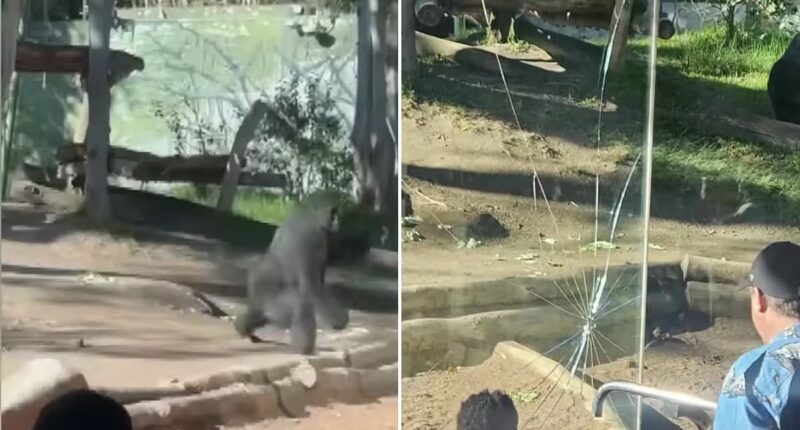Share this @internewscast.com
Panic spread through the San Diego Zoo over the weekend when a 10-year-old western lowland gorilla unexpectedly charged at the glass barrier of his enclosure, breaking one of its three protective layers.
The robust primate, a 400-pound gorilla named Denny, broke a section of the tempered glass at the zoo’s Gorilla Forest habitat on Saturday afternoon, according to zoo officials.
Footage captured by onlookers shows the intense moment when Denny ran at full speed toward the barrier, crashing into it, causing some families to scream and quickly move away from the enclosure.
‘It literally felt like an earthquake before we realized that that was just him hitting the glass,’ said visitor Jackie Doubler to 10News.
‘It was pretty scary. There definitely were people there quick though – security guards. The zoo handled the situation well.’
In the footage, visitors can be heard gasping as the glass shattered from around the point of impact.
While some zoogoers rushed away, others moved in closer to see the damage for themselves.
‘If he would hit that glass again, I definitely feel like it would have been a whole different story though,’ Doubler added.

A 10-year-old western lowland gorilla charged at the glass barrier of his enclosure at the San Diego Zoo this weekend, shattering one of its three protective layers.

The powerful primate, a 400-pound gorilla named Denny, smashed a section of tempered glass at the zoo’s Gorilla Forest habitat on Saturday afternoon
The San Diego Zoo later assured that Denny was unharmed, and noted that the glass consisted of three layers of tempered safety material, with only one layer being damaged.
The gorilla and his enclosure companion have been temporarily moved behind the scenes while repairs are completed.
Denny’s sudden burst of energy came just weeks after the unexpected passing of his older brother Maka, a 30-year-old western lowland gorilla who died in August due to a cardiac event.
Zoo officials said in a statement that the behavior, while shocking to witness, wasn’t out of the ordinary.
‘It is common for male gorillas, especially in adolescence, to express these types of behaviors,’ a spokesperson said.
‘Bursts of energy, charging, dragging items, or running sideways are all natural for a young male.’
Dr. Erin Riley, a primate behavior specialist and anthropology professor at San Diego State University, told CBS8 that ‘charging displays’ are a normal part of gorilla behavior.
‘Gorillas, particularly males, will often do what we call “charging displays,” as a kind of act of showing off,’ Riley explained.
‘One of the things gorillas actually don’t like is to be stared at directly in the eyes, and that’s not something that zoo visitors always understand.’

While some zoogoers rushed away, others moved in closer to see the damage for themselves

Zoo officials said in a statement that the behavior while shocking to witnesses was not uncommon for young male gorillas
Riley added that it’s possible Denny felt threatened or overwhelmed by the crowd at the time.
‘Given that it was directed towards the window, which is where the visitors are, I don’t know if they were feeling threatened, if there were a lot of people there that made Denny feel a little bit threatened,’ she said.
Dr. Annie Petersen, an animal behavior and bonding expert, echoed such sentiments.
‘It may not necessarily have been an aggressive reaction; it may have been one of excitement, it may have been one of exploration,’ Petersen said.

Denny’s outburst also came just weeks after the death of his older brother Maka, a 30-year-old western lowland gorilla who died unexpectedly in August after suffering a cardiac event
Following the incident, other guests urged the public to be more mindful around the zoo’s exhibits.
‘They’re super strong. We need to be respectful of them, and also respectful of their space,’ said visitor Andrea Corry.
‘A lot of people hit the glass, tap it, try to provoke them, and we need to just observe – watch them, not aggravate them.’
Western lowland gorillas are the largest primates in the world, standing up to six feet tall and weighing as much as 500 pounds, according to the San Diego Zoo.
The species is critically endangered in the wild due to deforestation and poaching across central Africa.















